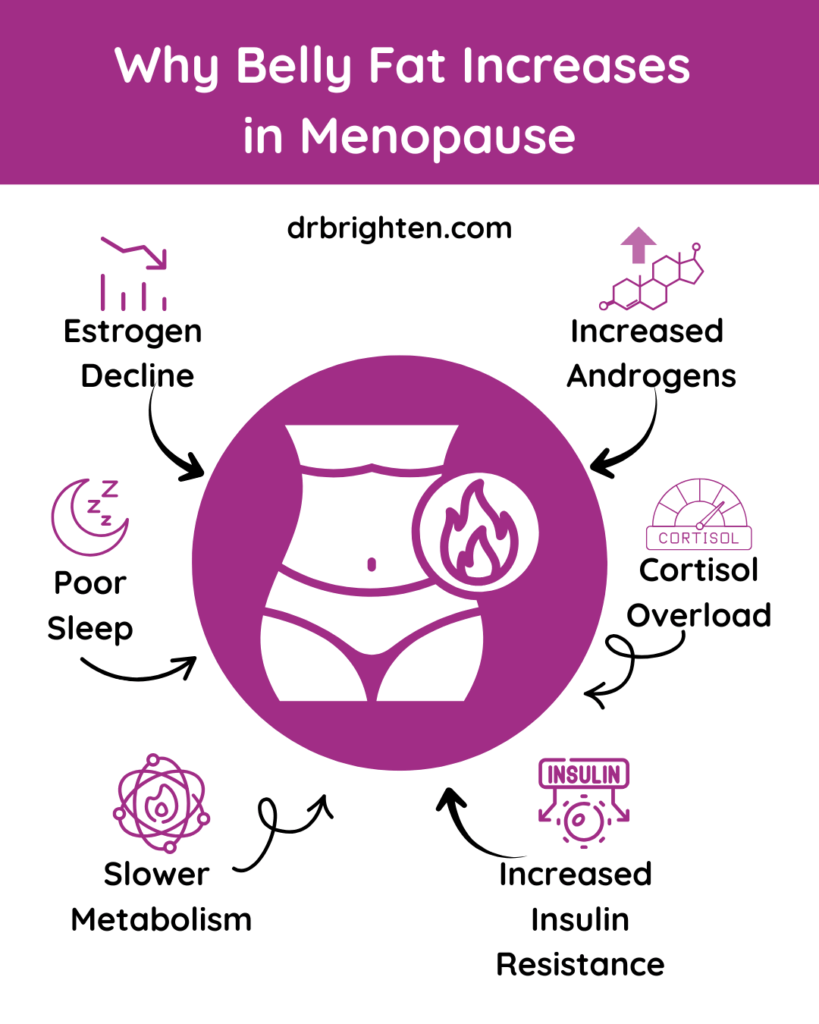Struggling with stubborn belly fat during perimenopause or menopause? You’re not alone. Even active, health-conscious women notice their waistline changing as hormones shift. Estrogen decline, cortisol spikes, and insulin resistance make it easier to store fat around the middle and harder to burn it off. The good news? Specific supplements for menopause belly fat can help with changing hormones, support metabolism, and restore confidence.
This creeping shift in your waistline is one of the most frustrating and common changes women experience1 during perimenopause and menopause, according to research studies. Even when you're eating well and staying active, the hormonal upheaval of menopause can reroute fat straight to your belly.
Fluctuating hormones, slowed metabolism, stress, poor sleep, and changes in insulin sensitivity all contribute to menopause belly fat that’s harder to lose than when you were younger. “Meno belly” can be disheartening and feel stubborn, but that doesn’t mean you’re stuck with it.
Below, we’ll explore why belly fat becomes more common during menopause, and which supplements for menopause belly fat can actually make a difference. You’ll also learn what to avoid, how to support your metabolism, and how to turn the tide on this sneaky symptom of midlife.
In this article:
- Why Belly Fat Increases in Menopause
- Best Supplements for Menopause Belly Fat
- Other Herbs for Menopause Belly Fat
- What to Look for in the Best Menopause Weight Loss Supplement
- Menopause Belly Diet: Foods to Avoid
- Final Thoughts: How to Lose Belly Fat in Menopause Naturally
- Frequently Asked Questions: Supplements for Menopause Belly Fat
Why Belly Fat Increases in Menopause
Even if you haven’t changed your eating or exercise habits, hormonal changes during perimenopause and menopause can change how your body stores fat, especially around your waistline.
More specifically, menopausal women are more likely to gain visceral (abdominal) fat, which is linked to increased risk for several health problems2, including higher levels of inflammation and heart disease.
Researchers have found that postmenopausal women are almost five times (4.88‑fold) more likely3 to develop belly fat compared to women who haven’t reached menopause yet.
And, studies show that during menopause, visceral (deep belly) fat increases by about 44% and lower‑body fat by about 32%, which helps explain the typical shift from a pear‑shaped to an apple‑shaped body pattern.
Estrogen decline
Estrogen has the job of helping to promote insulin sensitivity and fat burning, and to regulate fat storage and metabolism (among many other roles). So when estrogen levels drop, fat typically shifts from the hips and thighs to the abdominal area4, even if overall weight gain isn't high.
Increased androgens
As estrogen levels fall during menopause, the liver produces less sex hormone–binding globulin (SHBG), a protein that helps regulate hormones in the bloodstream. When SHBG drops, androgens (like testosterone) become more freely available, which encourages more fat to collect in the abdominal area.
Increased insulin resistance
Menopause often coincides with decreased insulin sensitivity, which leads to more fat storage. With less estrogen and muscle mass, the body doesn’t process glucose as effectively, causing more sugar to be stored as fat instead of being used for energy.
Cortisol overload
Chronic stress increases cortisol, a hormone that triggers fat storage in the belly. High cortisol not only promotes visceral fat but also breaks down muscle tissue over time, slowing metabolism and making it even harder to shed extra pounds.
Poor sleep
Sleep disturbances are common in menopause and are linked to weight gain and blood sugar dysregulation. Of course, being tired can also increase cravings for unhealthy foods (like those with lots of sugar and carbs), which can further increase belly fat.
Slower metabolism and obesity
Aging and reduced muscle mass5 can lower your basal metabolic rate, which is the amount of calories your body burns throughout the day, even when you're at rest. This makes weight gain more likely with age. In the United States, among women between 40 and 65, about 65% are obese6, and among women over the age of 65, that number jumps to almost 74%.
Quick Stats on Menopause Belly Fat
- 44 % average increase in visceral fat after menopause
- 4.9× higher risk of abdominal obesity post-menopause
- 65 % of U.S. women aged 40–65 are obese
- Estrogen drop = 5 % slower metabolism per decade
Ready to lose stubborn menopause belly fat naturally? Download The Perimenopause Weight Loss Action Plan — a free, doctor-designed guide to balancing hormones, reducing belly fat, and restoring your metabolism.
Related:
GLP-1 Weight Loss in Menopause: How HRT Amplifies Results
Which Hormones Affect Sleep? The Hormone-Sleep Connection Explained

Best Supplements for Menopause Belly Fat
There’s no magic “menopause belly fat pill” that will suddenly lead to weight loss or get rid of all menopause symptoms. However, certain nutrients and botanicals can target the root causes of menopause belly fat, including hormone imbalance, inflammation, insulin resistance, and poor metabolic function.
Related: Best Menopausal Supplements According to a Hormone Expert
1. Omega-3 Fatty Acids (EPA & DHA)
Omega-3s (such as Omega Plus), particularly those found in fish oil and algae, can help fight the low-grade inflammation that’s often at the root of stubborn belly fat. They also help improve insulin sensitivity7, making it easier for your body to metabolize glucose instead of storing it as fat.
Additionally, omega-3s are useful for regulating mood and hormonal activity, making them helpful during the hormonal fluctuations of perimenopause. And, studies show omega-3s often help reduce hot flashes and improve cognitive function and mood.
Omega-3 Fatty Acids (EPA & DHA)
- What it does: Reduces inflammation, supports insulin sensitivity, and improves lipid metabolism.
- Dose: 1,000–2,000 mg combined EPA + DHA daily.
- Recommended: Omega Plus
- Best for: Inflammation, insulin resistance, mood balance.
- How it helps menopause belly fat: Omega-3s decrease inflammatory cytokines and improve metabolic flexibility, helping your body use fat for energy rather than storing it.
- Precautions: Use high-quality, third-party-tested fish oil; avoid taking blood-thinning medication unless advised by your clinician.
2. Magnesium Glycinate
Low magnesium levels are linked to increased cortisol, poor sleep, and blood sugar instability—a triple threat for belly fat. During perimenopause and menopause, magnesium also supports nerve function, eases muscle cramps, and calms the nervous system. It can also help improve sleep quality, which is helpful for fighting cravings and having energy for exercise.
What magnesium is best for menopause? Magnesium glycinate—found in Magneium Plus—is the type I recommend for relaxation and stress support (plus it's gentle on the stomach), while magnesium threonate is another great option for brain fog and cognitive function.
Magnesium Glycinate
- What it does: Calms the nervous system, supports sleep, and regulates cortisol and glucose levels.
- Dose: 200–400 mg before bed.
- Recommended: Magnesium Plus
- Best for: Stress, sleep, blood sugar.
- How it helps menopause belly fat: Better sleep and cortisol regulation reduce emotional eating and fat storage while improving insulin sensitivity.
- Precautions: Magnesium citrate may cause loose stools in sensitive individuals; choose glycinate or threonate forms for best absorption.
Related: Understanding Magnesium for Menopause: Your Comprehensive Guide
3. Berberine
Berberine is one of the most well-studied natural compounds for metabolic health. It mimics metformin, a diabetes medication, by activating AMPK (your cellular energy switch), which allows it to help improve glucose metabolism and reduce insulin resistance, two drivers of menopause belly fat.
Berberine
- What it does: Activates AMPK, your body’s “metabolic switch,” improving glucose metabolism.
- Dose: 500 mg before meals, 2–3 × daily.
- Recommended: Look for GMP label, 3rd party testing, and quality ingredients
- Best for: Insulin resistance, blood sugar, gut health.
- How it helps menopause belly fat: Improves insulin sensitivity and reduces fat storage, particularly in the abdominal area.
- Precautions: May interact with diabetes medications; not for use during pregnancy or breastfeeding.
4. DIM (Diindolylmethane)
DIM helps break down and detoxify estrogen metabolites through the liver, which is critical during perimenopause when estrogen levels can fluctuate erratically. This rebalancing can support a healthier estrogen-to-progesterone ratio and may help reduce fat storage in the hips and belly. It's especially helpful for estrogen dominance symptoms like bloating, PMS, and tender breasts.
In one clinical trial8 in premenopausal women, supplementing with 75 mg of DIM led to a greater reduction in body fat compared to placebo (although higher amounts were thought to be needed to alter estrogen levels).
DIM (Diindolylmethane)
- What it does: Supports healthy estrogen metabolism through the liver.
- Dose: 100–200 mg daily.
- Best for: Estrogen balance, PMS, detoxification.
- Recommended: Balance Women’s Hormone Support by Dr. Brighten Essentials
- How it helps menopause belly fat: Promotes favorable estrogen ratios and reduces estrogen dominance, which contributes to fat storage around the midsection.
Precautions: Use with liver support nutrients (B vitamins, magnesium); avoid high doses without supervision.
5. Ashwagandha
Ashwagandha is an adaptogen that calms the HPA axis, reduces cortisol, and supports thyroid and adrenal health, all of which can contribute to midsection fat gain.
High cortisol not only leads to increased belly fat but also worsens sleep, mood, and cravings, often creating a feedback loop that ashwagandha helps interrupt. This makes it one of the best herbs for menopause, among others like saffron.
In one double blind trial9, ashwagandha root extract was found to be effective for supporting body weight management in adults under chronic stress.
Ashwagandha
- What it does: Adaptogen that supports adrenal function and balances cortisol.
- Dose: 300–600 mg standardized extract daily.
- Recommended: Adrenal Support
- Best for: Stress resilience, sleep, thyroid health.
- How it helps menopause belly fat: Lower cortisol levels decrease central fat accumulation and stabilize energy and mood during hormonal changes.
- Precautions: Avoid during pregnancy; check with your provider if on thyroid or sedative medication.
6. Probiotics (Targeted Strains)
Your gut microbiome influences estrogen metabolism, inflammation, appetite, and body weight. Certain probiotic strains have been shown to reduce belly fat10, support digestion, and even positively influence mood, making them relevant during the gut-hormone disruption of perimenopause.
What are the best probiotics for menopause belly fat? Look for strains like:
- Lactobacillus gasseri (shown to reduce abdominal fat)
- Lactobacillus rhamnosus
- Bifidobacterium breve
Consider my Women's Probiotic formula, which includes a blend of probiotics, prebiotics, and antioxidant-rich ingredients to support women’s wellness from the inside out at all stages of life.
Probiotics (Targeted Strains)
- What it does: Improves gut health and estrogen metabolism while lowering inflammation.
- Dose: Follow product instructions (typically 10–20 billion CFU daily).
- Recommended: Women’s Probiotic
- Best for: Gut-hormone axis, mood, digestion.
- How it helps menopause belly fat: Strains like L. gasseri and B. breve reduce visceral fat and support weight balance via the microbiome.
- Precautions: Choose strains tested for women’s health; may cause mild bloating initially.
Related: Connection Between Gut Health, Menopause, and Perimenopause
7. Vitamin B Complex
B vitamins are needed for healthy energy metabolism, neurotransmitter production, and adrenal function. Stress and hormonal fluctuations can deplete these nutrients quickly, including B6, B12, and folate, which help with mental performance, nutrient assimilation, and many other functions.
B Active Plus is a good option for obtaining methylated forms of vitamin B12, B6, folate, niacin, and more in forms that are easy for the body to absorb and utilize.
Vitamin B Complex
- What it does: Supports energy metabolism, neurotransmitter synthesis, and adrenal health.
- Dose: 1 capsule of a methylated B-complex daily with food.
- Recommended: B Active Plus
- Best for: Energy, metabolism, mood.
- How it helps menopause belly fat: B vitamins convert food into energy, reducing fatigue and supporting a healthy metabolic rate.
- Precautions: Choose methylated forms (B12 as methylcobalamin, folate as 5-MTHF) for optimal absorption.
8. Chromium + Inositol
Chromium and inositol are nutrients that help improve insulin sensitivity, regulate blood sugar levels, and reduce appetite and even carb cravings11, which are common complaints during menopause.
Together, they can potentially lead to better mood stability and fewer crashes between meals while supporting long-term metabolic health. This can be especially helpful for women in perimenopause (or those with PCOS), where hormone-related insulin resistance can make belly fat harder to lose.
A large meta-analysis12 of 21 trials involving over 1,300 people with overweight or obesity found that chromium supplementation led to small but statistically significant reductions in body weight, BMI, and body fat percentage. The benefits were most noticeable when taken for 12 weeks or less at doses of 400 mcg per day or lower.
Another meta‐analysis13 found that inositol supplementation has positive effects on BMI reduction in adults who are overweight or who have PCOS.
If you're looking for an easy way to get both, Myo Inositol Plus provides clinically relevant doses of myo-inositol paired with chromium picolinate—the most well-studied form of chromium for bioavailability and metabolic support.
Chromium + Inositol
- What it does: Enhances insulin sensitivity and stabilizes appetite and cravings.
- Dose: 200-400 mcg chromium + 2 g myo-inositol daily.
- Recommended: Myo Inositol Plus
- Best for: Blood sugar balance, carb cravings, mood.
- How it helps menopause belly fat: Reduces post-meal glucose spikes and appetite fluctuations, helping manage belly fat and emotional eating.
- Precautions: Not recommended with insulin-sensitizing medications without supervision.
Related: Is There a Natural Ozempic?
Other Herbs for Menopause Belly Fat
In addition to ashwagandha and DIM, these herbs can also potentially help with menopause symptoms, including increased belly fat:
- Rhodiola: Can help reduce fatigue and support energy and adrenal resilience
- Licorice root (DGL form): Supports estrogen balance and gut health
- Turmeric (curcumin): can help manage inflammation and support digestion and liver detoxification
What to Look for in the Best Menopause Weight Loss Supplement
A quality supplement should address multiple drivers of weight gain at once. Look for one that:
- Supports hormone balance (especially estrogen metabolism)
- Improves blood sugar and insulin sensitivity
- Can help lower cortisol and calm the stress response
- Boosts energy, thyroid function, and metabolic rate
Many women find better success with all-in-one formulas that blend adaptogens, B vitamins, and metabolism boosters, rather than taking many separate supplements.
For example, consider taking Radiant Mind (which includes saffron, bacopa, and zinc) for stress support, improved focus, and a lift in your mood and cognitive performance. You can also try Adrenal Support + B Active Plus combo for energy and hormonal balance support.
Menopause Belly Diet: Foods to Avoid
Supplements work best when they're paired with diet changes, exercise, and other healthy habits, like managing stress and getting enough sleep. Since some foods (especially those that are highly processed) can increase inflammation and fat storage, it's wise to limit or avoid them during menopause and afterward.
Here are foods I recommend skipping during perimenopause and menopause (and beyond) to maintain a healthy weight:
- Ultra-processed snacks: These can include most chips, cookies, desserts, and even “healthy” sounding things like granola bars. They're usually low in nutrients but high in calories.
- Refined sugars & flours: These spike insulin and can encourage belly fat storage.
- Seed oils (like canola, soybean, corn): They can promote inflammation and are often found in packaged foods that also contain other unhealthy additives.
- Alcohol: It disrupts liver metabolism and estrogen clearance, increases calorie intake, and can mess with your sleep, appetite, digestion, and mood.
Related:
Tips to Help With Menopause Weight Loss
Intermittent Fasting for Menopause: What You Need to Know to Before You Start
The Best and Worst Breakfast Foods for Hormone Health
Final Thoughts: How to Lose Belly Fat in Menopause Naturally
You don’t have to accept menopause belly fat as your new normal. By targeting the root causes—like stress, poor diet choices, blood sugar imbalance, and hormone shifts—you can reclaim your metabolism, confidence, and libido.
Start with these supportive nutrients:
- Adrenal Support for cortisol balance
- B Active Plus for metabolic energy
- Radiant Mind for mood + motivation
- Then, layer in gut, liver, and blood sugar support to take your results further
Ready to Lose Stubborn Weight in Perimenopause?
Your body isn’t broken, it’s just changing. Get The Perimenopause Weight Loss Action Plan, which I designed to help you rebalance hormones, reduce belly fat, and feel like yourself again.
Download it free here and you'll get:
- A 7-day meal plan + 21 easy recipes
- Daily hormone-balancing checklists
- Metabolism-boosting workouts
- Sleep, stress & supplement tips
Frequently Asked Questions: Supplements for Menopause Belly Fat
The best supplements for menopause belly fat target hormonal imbalance, inflammation, and insulin resistance — the three root causes of “meno belly.” Top choices include omega-3 fatty acids to reduce inflammation, magnesium glycinate for cortisol and sleep support, berberine to improve insulin sensitivity, and ashwagandha to lower stress hormones. Probiotics, DIM, and B vitamins also support metabolism and hormone balance.
During perimenopause, hormones fluctuate sharply, so supplements that stabilize estrogen and cortisol are especially helpful. Magnesium, DIM, B-complex vitamins, berberine, and adaptogens like ashwagandha or rhodiola can help manage belly fat, mood, and energy. Combining these with a protein-rich diet and strength training improves results.
Yes. Several herbs for menopause belly fat support hormonal and metabolic balance:
– Ashwagandha lowers cortisol and supports thyroid health.
– Rhodiola rosea improves stress resilience and energy.
– Turmeric (curcumin) reduces inflammation and supports liver detoxification.
– Licorice root (DGL) supports estrogen balance and digestion.
– DIM from cruciferous vegetables promotes healthy estrogen metabolism.
These herbs work best when paired with healthy eating and exercise.
The best probiotic for menopause belly fat contains clinically studied strains such as Lactobacillus gasseri, L. rhamnosus, and Bifidobacterium breve. These support gut health, balance estrogen metabolism, and reduce visceral fat. Look for multi-strain formulas like Dr. Brighten Women’s Probiotic, which also includes prebiotics and antioxidant-rich compounds for hormone and mood support.
Magnesium glycinate is ideal for relaxation, sleep, and cortisol balance, while magnesium threonate supports cognitive function and mood — both forms can help reduce stress-related belly fat. Avoid magnesium oxide, which has poor absorption. Most women benefit from 200–400 mg daily, ideally taken before bed.
There isn’t a single “magic” menopause weight loss pill, but combinations that support multiple systems work best. Look for formulas that:
– Regulate hormones (DIM, B vitamins)
– Improve insulin sensitivity (berberine, chromium, inositol)
– Lower cortisol (ashwagandha, rhodiola)
– Boost metabolism and mood (omega-3s, saffron, bacopa)
Dr. Brighten’s Radiant Mind and Adrenal Support + B Active Plus stack are examples of comprehensive, research-based combinations.
A healthy menopause belly diet focuses on stabilizing blood sugar and reducing inflammation. Emphasize:
– Lean protein at each meal (for muscle and metabolism)
– High-fiber vegetables and low-glycemic carbs
– Anti-inflammatory fats like olive oil and omega-3s
Avoid ultra-processed foods, refined sugars, seed oils, and excess alcohol, which promote visceral fat and hormonal imbalance.
To reduce menopause belly fat, avoid:
– Processed snacks and sweets high in refined sugar
– White bread, pasta, and pastries
– Fried foods and seed oils (canola, soybean, corn)
– Alcohol and sweetened drinks
These drive insulin spikes, cortisol surges, and inflammation — all linked to stubborn abdominal fat.
Results vary, but most women notice changes within 6–12 weeks of consistent use alongside a balanced diet and movement routine. Supplements aren’t quick fixes; they support hormonal and metabolic balance over time, helping reduce inflammation, improve energy, and make weight loss easier to maintain.
Supplements are most effective when combined with strength training, adequate protein, stress management, and sleep support. Think of them as tools that help your body rebalance hormones and metabolism so healthy habits work more efficiently.
References
- https://pmc.ncbi.nlm.nih.gov/articles/PMC5509974/ ↩︎
- https://pubmed.ncbi.nlm.nih.gov/39814903/ ↩︎
- https://pmc.ncbi.nlm.nih.gov/articles/PMC5509974/ ↩︎
- https://pubmed.ncbi.nlm.nih.gov/19217444/ ↩︎
- https://pubmed.ncbi.nlm.nih.gov/7885283/ ↩︎
- https://pmc.ncbi.nlm.nih.gov/articles/PMC5509974/ ↩︎
- https://pubmed.ncbi.nlm.nih.gov/37374105/ ↩︎
- https://pubmed.ncbi.nlm.nih.gov/36111381/ ↩︎
- https://pmc.ncbi.nlm.nih.gov/articles/PMC5871210/ ↩︎
- https://pmc.ncbi.nlm.nih.gov/articles/PMC11187407/ ↩︎
- https://pmc.ncbi.nlm.nih.gov/articles/PMC7433292/ ↩︎
- https://pubmed.ncbi.nlm.nih.gov/31115179/ ↩︎
- https://pmc.ncbi.nlm.nih.gov/articles/PMC9159559/ ↩︎




